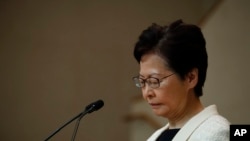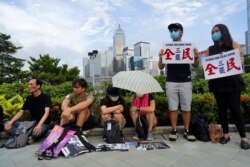Hong Kong’s struggling chief executive has denied that she discussed resigning with Chinese officials amid growing pro-democracy protests, despite having been heard in a leaked audio recording saying she would step down if she had a choice.
In the recording, obtained by Reuters, Carrie Lam told a group of business leaders last week that she had caused “a huge havoc" when she introduced a controversial extradition bill that sparked the protests. In the recording, which is available online, she tells the group, "If I have a choice, the first thing is to quit, having made a deep apology, is to step down."
Protest leaders took the remarks to mean that officials in Beijing would not permit her to resign. But Lam told reporters Tuesday she "had not even contemplated" discussing a resignation with Chinese leaders. When asked specifically if Beijing was stopping her from resigning, Lam said she has "never tendered a resignation to the central people’s government."
Nevertheless, many Hong Kong residents said the recording confirmed what political scientists and protesters have long believed -- that despite Hong Kong’s separate constitution, Beijing runs the city.
“It confirms the image she’s a puppet,” said Ma Ngok, an associate professor of government at Chinese University of Hong Kong. “I don’t think she earns much more sympathy.”
Willy Lam, a lecturer in Chinese politics, suggested that Beijing wants Lam to remain in office so that radical protesters will grow more frustrated and use greater force when confronting police. That, he said, will turn public opinion against the protesters and justify more numerous arrests.
Protesters fear Tiananmen-style crackdown
Some residents have expressed concerns about the risk of a Chinese military intervention similar to its crackdown on the Tiananmen Square protests in 1989.
In the recording, Carrie Lam sought to assure business leaders that the Beijing government “has absolutely no plan to send in the PLA” or People’s Liberation Army.
She said she doesn't know how long it will take to end the civil disobedience, but that she remains confident of restoring law and order. She dismissed speculation that Beijing is anxious to resolve the crisis by Oct. 1, the 70th anniversary of the People’s Republic of China.
“It would be naive of me to paint you a rosy picture that things will be fine or I have a deadline,” the chief executive says in the recording. “But I can assure you that Beijing does not have a deadline. They know this will ripple on. They and ourselves have no expectation that we could clear out this thing before the first of October.”
Lam was elected as Hong Kong's chief executive in 2017 by a pro-Beijing committee of Hong Kong business and civic leaders.
The protests over the now-suspended extradition bill, which would have permitted criminal suspects to be sent to mainland China for trial, have since evolved into calls for greater democracy and an independent probe into allegations of police brutality.
The demonstrations have brought everyday life in the Asian financial hub to a near halt, with protesters disrupting activities at the city's subway system and airport. Hundreds of protesters have been arrested after clashes with police wielding batons and firing tear gas and water cannons.






